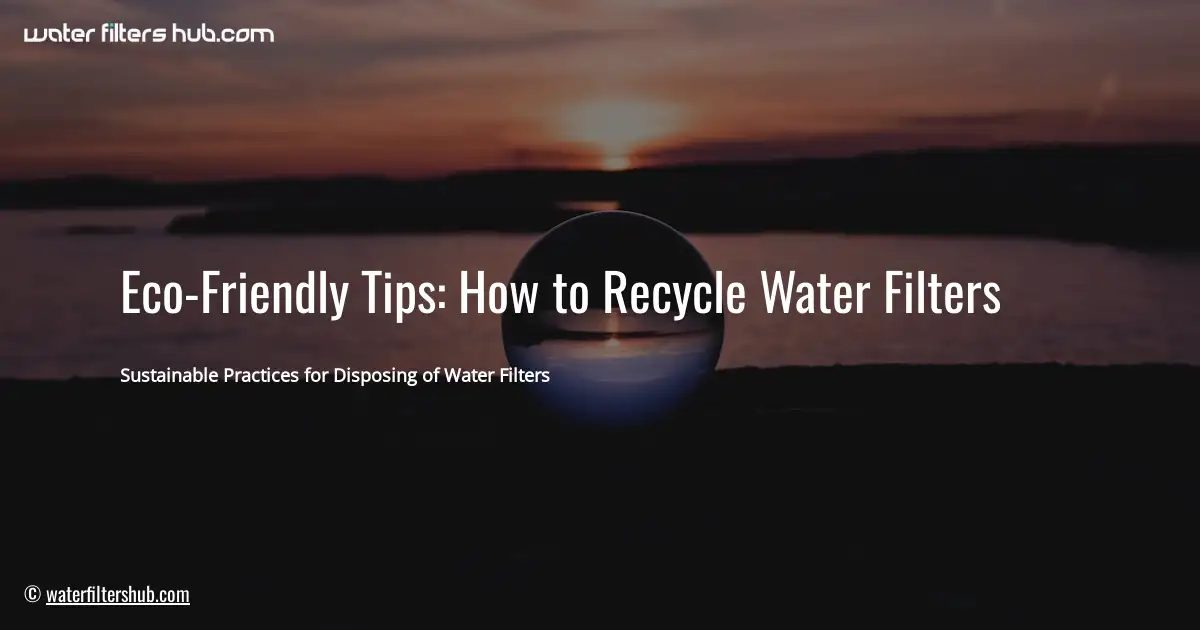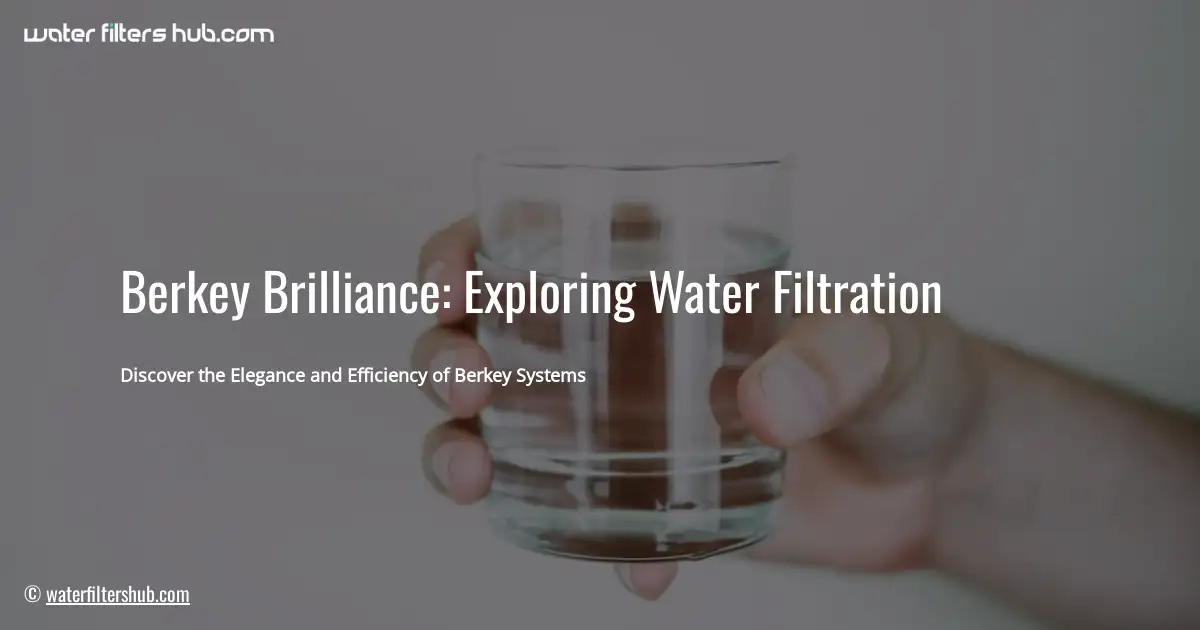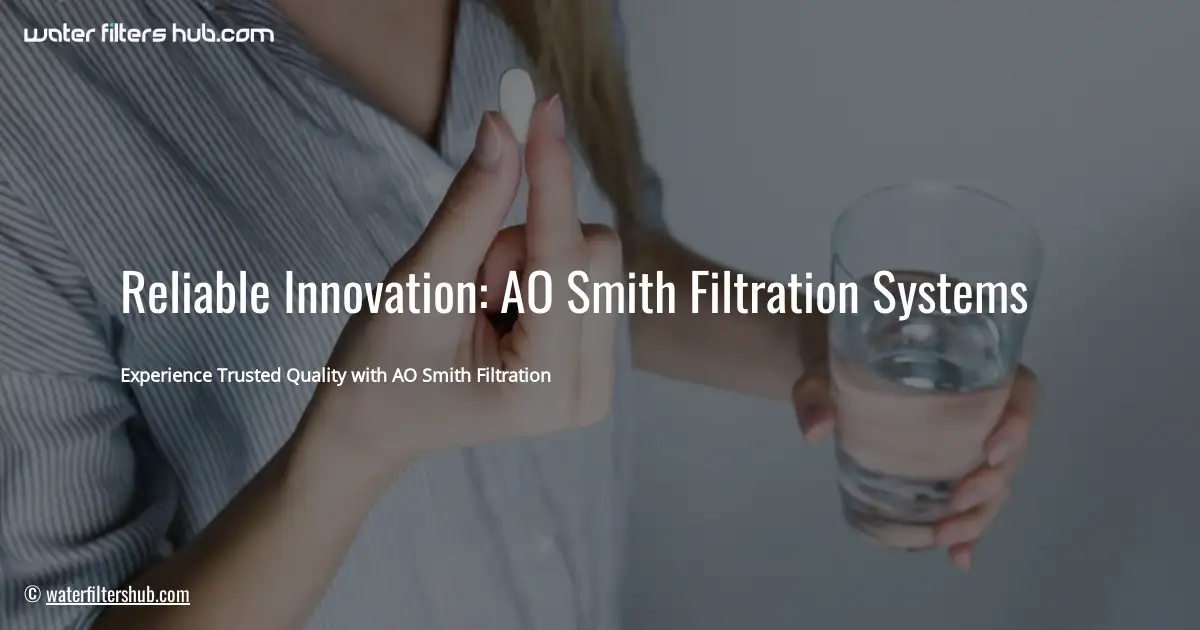Sustainable Practices for Disposing of Water Filters
Recycling Water Filters: A Crucial Step for Environmental Sustainability 🌍💧
Recycling water filters is an essential practice for preserving our planet. Improper disposal of these filters can have detrimental effects on the environment, polluting landfills and contaminating water sources. By recycling water filters, we can reduce waste, conserve natural resources, and protect the health of our ecosystems.
Imagine this: every year, millions of water filters end up in landfills, taking up valuable space and releasing harmful chemicals into the environment. These filters contain materials like activated carbon and ceramic, which can take hundreds of years to decompose. By recycling these filters, we can prevent them from contributing to the growing waste problem and conserve precious resources.
TYPES OF WATER FILTERS
Reverse osmosis (RO) filters are a type of water filter that uses a semipermeable membrane to remove impurities from water. The membrane allows water molecules to pass through, but it blocks larger molecules, such as bacteria, viruses, and minerals. RO filters are very effective at removing impurities, but they can also be expensive and require a lot of maintenance.
Pros:
- Removes a wide range of impurities
- Can be used to treat well water or municipal water
- Can produce high-quality drinking water
Cons:
- Can be expensive
- Requires a lot of maintenance
- Can waste a lot of water
RO filters are a good option for people who want to remove a wide range of impurities from their water. However, they are not the best option for everyone. If you are on a budget or if you do not want to deal with a lot of maintenance, you may want to consider a different type of water filter.
WHY RECYCLE WATER FILTERS?
Recycling water filters is a crucial step towards preserving our planet. 🌎 It’s like giving your filter a second chance to make a difference! By diverting them from landfills, we reduce waste, conserve resources, and protect the environment. ♻️
Consider this: every water filter we recycle is one less piece of plastic or metal that ends up polluting our oceans or taking up valuable space in landfills. 🗑️ It’s like a tiny act of heroism for our planet! 🦸♂️
How to Recycle Water Filters
Recycling water filters varies depending on the type:
-
Activated Carbon Filters: Remove these filters from the housing and place them in a plastic bag or container. Label the bag “Activated Carbon Filter” and dispose of it in your regular trash.
-
Reverse Osmosis Filters: These filters have multiple components:
- Membrane: Contact your local recycling center to see if they accept RO membranes.
- Cartridges: Dispose of these in your regular trash.
- Tubing: Cut the tubing into small pieces and dispose of it in your regular trash.
-
Ceramic Filters: These filters can be composted or repurposed. To compost, break the filter into small pieces and add it to your compost pile. To repurpose, use the filter as a plant pot or a drainage layer in a planter.
Contacting Local Recycling Programs
Before recycling your water filters, contact your local recycling center to confirm their acceptance policies. They can provide specific instructions and ensure proper disposal.
Alternative Disposal Methods
Composting
Composting is a fantastic way to dispose of used water filters that are biodegradable, like ceramic filters. Simply break the filter into smaller pieces and add them to your compost pile. The organic material in the filter will decompose over time, enriching your soil with nutrients. 🌱
Repurposing
Repurposing is a creative alternative to recycling. For instance, you can use old activated carbon filters as odor absorbers in your refrigerator or car. They’re also great for removing impurities from the air in your home. 💡
HOW TO RECYCLE WATER FILTERS ON YOUTUBE
Benefits of Recycling Water Filters
Recycling water filters offers a plethora of benefits that extend beyond environmental protection. 🌱 It’s a win-win situation for us and our planet!
By recycling water filters, we actively contribute to resource conservation. 💧 Imagine it as a tiny step towards ensuring a sustainable future for generations to come. Every filter recycled is a small victory in the fight against resource depletion. ✊🏻
Furthermore, recycling water filters significantly reduces waste. 🗑️ Instead of ending up in landfills, these filters find new life through recycling programs. It’s like giving them a second chance to make a positive impact! ♻️
In a nutshell, recycling water filters is a simple yet powerful act that benefits us all. It’s a testament to our commitment to protecting our planet and creating a more sustainable future. 🌎
Consequences of Improper Disposal 💔
Improper disposal of water filters can have dire consequences for our planet and our health. 🌍 💧
Landfill pollution is a major issue, as these filters take up valuable space and can leach harmful chemicals into the environment. ☢️ Water contamination is another concern, as improper disposal can allow toxic substances to seep into our water sources. 💦 This can pose a serious threat to both human and animal health. 😷
It’s essential to remember that even small actions can have a big impact. By properly recycling water filters, we can help protect our environment, conserve natural resources, and safeguard our health. ♻️
Tips for Sustainable Water Filtration 💧
Just like your car needs regular oil changes, your water filter needs a little TLC too! By extending the life of your filter, you’re not only saving money but also reducing waste. Here are a few simple tips:
- Rinse it out: Regularly rinsing your filter with clean water can remove sediment and extend its lifespan.
- Clean it up: If your filter is washable, give it a thorough cleaning every few months.
- Change it less often: If your water quality is good, you may be able to get away with changing your filter less frequently. Check the manufacturer’s recommendations for your specific filter.
By following these tips, you can keep your water filter running smoothly for longer, saving you time, money, and the environment. 🌍
Case Studies 🗣️
When it comes to recycling water filters, real-life examples speak louder than words. One such success story is the “Project Filter” initiative in Chicago, Illinois. This program has collected and recycled over 50,000 water filters since its inception in 2017. The filters are processed at a local recycling facility, where they’re broken down into their component materials, such as plastic, carbon, and metal. These materials are then reused in the production of new products, reducing waste and conserving resources.
Another notable case study is the “Water Filter Recycling Challenge” organized by the City of Austin, Texas. This initiative encourages residents to recycle their old water filters at designated drop-off points. The collected filters are then sent to a recycling facility, where they’re processed and transformed into new materials. The program has not only reduced landfill waste but also raised awareness about the importance of sustainable water filter disposal.
Conclusion
A Call to Action for Sustainable Water Filter Disposal 🌍♻️
Recycling water filters is an essential step towards protecting our planet. By properly disposing of these filters, we can reduce landfill waste, conserve natural resources, and safeguard our environment. Every recycled filter makes a difference, and together, we can create a more sustainable future for generations to come.
Let’s all embrace the responsibility of being eco-conscious consumers. By making informed choices about our water filtration systems and ensuring their proper disposal, we can contribute to a cleaner, healthier planet for ourselves and those around us. Remember, every drop of water we save is a step towards a brighter tomorrow. 💧✨
HOW TO DISPOSE OF OR RECYCLE WATER FILTERS – THE CITY OF CAMBRIDGE
HOW TO DISPOSE OF OR RECYCLE WATER FILTERS – WATERTOWN-MA.GOV
HOW WATER FILTERS
HOW ARE WATER FILTERS MADE
HOW LONG DO BRITA WATER BOTTLE FILTERS LAST
WHAT WATER FILTERS CAN REMOVE PFAS
HOW LONG DO ZERO WATER FILTERS LAST







Leave a Reply